Genre: Sports Developer: BlueSky Software Publisher: Sega Enterprises Players: 1-2 Released: 1992
Joe Montana II: Sports Talk Football is the second in a series of nails in Sega Sports’ coffin as it failed to compete with the superior Electronic Arts’ John Madden Football franchise. While later games did improve enough to be considered a contender, from the sloppy birth of the original Joe Montana Football to its final thud on Saturn, the only real good which came from Sega’s football series were the hilarious ads featuring the franchise namesake. While some could question the marketing strategy of using a tremendously fat man with “GO JOE” painted across his bosoms to sell the latest game in 1995, no amount of advertising could excuse the poor gameplay when compared with other NFL offerings of the time.
None of this phased me when I purchased my first football video game ever back in 1991. See, I was not a football fan at the time, but I was captivated by the then amazing presentation of Sports Talk Football. First, there was voice commentary coming out of my Genesis: “The pitch to the back. Boom! He’s hit as he gets to the twenty-six yard line.” There’s quite a bit of variety in the speech, and the voice synthesis is relatively clear and nonstop. While this may seem trite with the advent of disc based games and their oodles of color commentary, useless fluff asides, and seamless integration of recorded phrases, back in 1991 this was amazing. This was the next level.
It didn’t stop there. While Super Nintendo games trumpeted its Mode 7 zooming functions, here was Joe Montana II, running on my Genesis, zooming into the action to focus on the play at hand. The horizontal view of the field, littered with tiny Tecmo Bowl-size characters, scales in on running plays or when the ball is thrown to give a better view of the action. Adding to the broadcast feel was a halftime review featuring an announcer who would comment on the game’s statistics up until that point, blank sheets of papers strewn about his Sega Sports Network desk. I could even pause the game and watch a replay, holding the A button down to enjoy a slow motion view of a particularly good pass or whatnot. I had bought a Genesis for the arcade experience, and here was this game, talking to me, delivering something I could not find in the arcade. This was amazing.
In 1991. Now that I’ve become a fan of football since then, my opinions of Sports Talk Football have suffered greatly. Back then, I could overlook the occasional vocal hiccup since I was so enamored by the play-by-play commentary. It was okay that I would sometimes hear a punt-related call on a passing play. I forgave the annoying, constant crowd static since the voice more than made up for it. Sure the animation wasn’t the best and the players lacked variety in their movement, but I excused that fact since the game appeared to be running two separate games at once – the smaller, full view and the “scaled in” large close-up. The game is choppy, both with its audio commentary and with its presentation, and while that is certainly understandable given the game’s age, that does not make it any less noticeable or distracting.
I also was not concerned about how poorly it played in 1991. I didn’t pay any mind to how the players slip and slide about the field, never quite feeling connected to the ground in any way. Take control of a line backer to blitz and you’ll have to skate him over to the line of scrimmage, being careful that his momentum doesn’t slide him into the neutral zone. Running out of the pocket is made more dangerous from this as well since the quarterback cannot pass the football until he comes to a full stop. Jump and dive moves should add to player interaction, but they’re so poorly implemented that they just highlight the sloppy control.
Despite the availability of forty-two offensive plays, the poor player movement and control limits the worthwhile selection to about three plays: a long bomb, short pass over the middle, and a run to the outside. The way the players pinball off each other on contact make inside runs futile, and the passing game is chiefly a roll of the dice as the limited screen view and zoom option will prevent you from seeing if the receiver has followed his route or is open. Passing often breaks down into cycling the cursor to the guy you hope is open and praying for the best. The A.I. in the game is particularly bad; don’t expect blocking on kick returns or an available lineman to pick up on an unblocked blitzer. Defense can be broken down into pass coverage or run coverage more or less, as the slow player speed and poor A.I. render options such as safety blitzes useless.
It’s not an easy game to pick up and play either. A clumsy menu greets the player after the title screen where various options can be set. For some reason, changing the default teams require visiting a sub-menu and flipping through various locker images one at a time, each city grouped by its corresponding NFL division, and then exiting back to the main menu. A toggle for weather exists but does not appear to impact the game performance whatsoever be it rain or snow. Games can be set for 20, 40, and 60 minutes; and penalties, zoom, voice, and music can be turned off as well. Turning off the zoom option kills the annoying “scaling” pauses in-game as well as provides a greater view of the field, but in doing so you can only serve to kill half of the game’s selling point. Too bad there is no way to turn off the annoying “load” times between selecting a play and the game taking you from the playbook to the field, a fading black effect which tacks on another three to five seconds per change and only aids to drag an already slow moving game to a crawl.
Sports Talk Football is very much a game of chance. With no licensed players or way to identify people while playing, you never know really what you’re dealt. Of course, Joe Montana is a great quarterback in game as expected, but every other player looks to be a carbon copy of the next. While you can check player ratings in the Dream Team menu where you can mix and match players to be recalled via password, that won’t help once the game begins and its time to select a formation and distribute the ball. Sports game fans are often derided for buying simple roster update releases each year, but its that personalization which can help make a game entertaining and add to its longevity. Many people still enjoy Tecmo Bowl, largely because it remains a fun, well-made game, but also because they know they can enjoy abusing Jerry Rice or Barry Sanders for numerous lengthy touchdowns. In Joe Montana II, everyone is the same, and you never know to which tight end or wide receiver you’re passing.
It’s a game without a soul, sold simply on the technology present in the cartridge. Even titles such as Mutant League Football and Pigskin 621 A.D. pack more personality and gameplay than the far more vocal Joe Montana II. That’s the problem with the game – with the technology now commonplace, there needs to be another reason to visit the game. It could be enjoyable gameplay as in the titles above or to rekindle an old roster from past years, but Sports Talk has neither. Strip away the voice commentary, and the game is as generic as the “GO TEAM” and “Rah!” signs which the animated crowd shake on notable plays.
SCORE: 3 out of 10
Want another opinion on this game? Read our Double Take article!

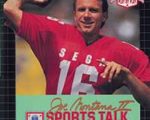
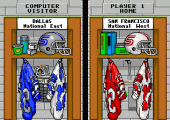
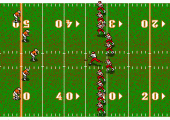
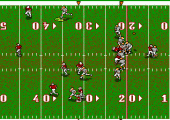
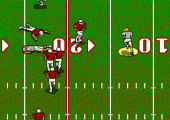
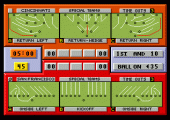
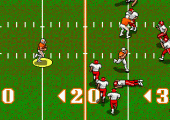
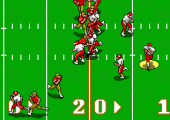
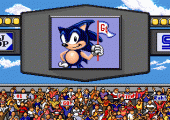
Recent Comments